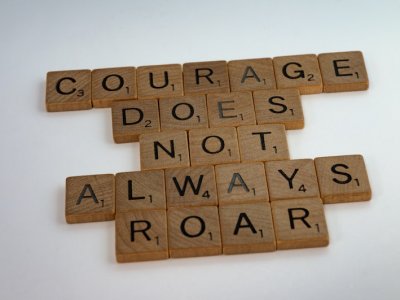How to be Brave (Even When You Are Afraid)

photo by: Brett Jordan
by Andrea M. Darcy
Been avoiding a confrontation? Or something you want to do in life, but haven’t had the courage? Learning how to be brave can be easier than you think.
What is bravery, really?
Yes, in emergency situations, we can be instinctively brave. Our brains take over, flooding our bodies with chemicals like adrenaline that see us be heroes.
But day-to-day bravery isn’t about emergencies. It’s about choices and challenges, like leaving a relationship that isn’t working for you. Travelling alone. Changing your career.
American researchers testing theories of courage concluded that to be brave has four parts. They are:
- intentionally deciding to take action
- believing the action involves risk for us
- but being motivated as we feel it will lead to a worthwhile, good ending
- deliberating carefully then taking the action.
How to be brave – 10 tips
What steps forward can this definition show us? And what other tips might be useful when it comes to how to be brave?
1. Recognise that you’ve already been brave.
Cast your mind back and find the moments, no matter how small, you have already stepped out your comfort zone and lived to tell the tale. We’ve all been a kid going to a first day of school, talked to someone with the risk of being rejected, or had to go to a doctor and get a needle.
2. Put your eye on the prize.

photo by Etty Fidele
When we need to be brave we will have many thoughts trying to trip us up, telling us why it’s too hard, or not to bother.
Keep your eye on the prize. What is the desired outcome? Where will you be in five years if you do this brave thing, or have this brave conversation? Where will we be if you don’t? Get crystal clear on your intentions.
3. Forget about perfect timing.
Waiting for the right moment is often just a delay tactic. There is rarely a perfect moment.
And if you are waiting until you don’t feel afraid, forget it. This is particularly true if you had a difficult childhood, and have complex PTSD. You will always have an anxious fight or flight response in the face of stress. The trick is to learn to do what the title of the famous book by Susan Jeffers suggests. “Feel the fear, and do it anyway”.
4. But differentiate good fear and bad fear.
Often what we call fear is actually nervous excitement, or the sensation of pushing outside of our comfort zone.
But if there is real danger, if you are wanting to break up with someone and you suddenly have the sense they might lash out and hurt you, for example? This is real fear. You need to get away.
5. And don’t confuse sabotage with bravery.
Sometimes, if we feel really overwhelmed at the thought of doing something, it’s because we simply don’t have the mental or emotional capacity at the moment and need to practice self-care. And that’s okay.
For example, if we have long wanted to take someone to court for something awful that happened to us as a child, that’s a great reason to find your bravery. But to suddenly decide to do that three months into your first pregnancy, when you need to be calm and healthy, that might self-sabotage.
6. Ask good questions.
Sometimes we work ourselves up to believe we are facing a huge danger that requires all our bravery. When in reality, most of the drama is simply in our heads.
Youspend weeks thinking that if you tell our boss you need to quit she will freak and the company will not do well without you. Meanwhile, the conversation finally happens and it takes three minutes. She’s fine with it and already has someone else to replace you.
To avoid getting caught up in ‘cognitive distortions‘, it helps to ask good questions.
- What is the situation really about?
- Are your thoughts about it facts with evidence, or assumptions?
- What might you not know about the situation?
- How could you get more facts?
- How could it all turn out differently than you expect?
7. De-charge and then de-charge some more.
Being brave can all fall to bits if we end up in a puddle of tears or get angry before we even get out what we need to get out. This happens as we are still emotionally ‘charged’. Often we are unwittingly also ‘triggered’, bringing emotions into the picture that are from older experiences, perhaps as far back to childhood.
Use techniques in advance to ‘de-charge’, such as journalling, mindfulness, a brisk walk, punching pillows, dancing it out… whatever works to calm you down. And if you need several weeks of this first, that’s okay.
8. Make it bigger than yourself.
Ever noticed how you can faff about when it comes to your own personal projects, but when it’s something you are doing for someone else, you are an organisational machine?
Human connection is energising and inspiring. When we do things that are bigger than ourselves, we surprise ourselves.
Use this to your advantage by finding a way to connect your brave act with others. If you are quitting your job as you hate it, for example, it will also mean you are less stressed around your kids. If you are making a speech, you are sharing information that others need. This is not just about you.
9. Find the worse case scenario.
This is a coaching technique. The idea is that we avoid doing things because somewhere in the back of our minds is the certainty some big horrible thing will happen. But what?
If we take the time to stop, focus, and ask, “What is the absolutely worse thing that can happen here?” Then we can also ask, “And can I handle that? What can I do to navigate that?”
For example, if you finally drop out of that university course you hate but your parents wanted you to take, they might be really angry. They might not talk to you for a few months. Can you survive that? Is it possible that it is not as life or death as you’ve convinced yourself? And is it better or worse than waking up each day with a sense of dread?
10. Be willing to do a terrible job of it.
Sometimes we fail. We say we are going to quit our job, walk in, and walk out with a promotion instead. We say we’re going to leave our partner, and end up hopping into bed then planning a vacation.
The alternative to learning how to be brave and giving it a good go is doing nothing. If we do nothing, we never learn, and life never changes.
You can always try again. And you also have the right to change your mind. Things are never as black or white as we try to tell ourselves. If you want to back out of the vacation, you can. And if you realise that actually, you’re thrilled about the promotion, then that’s okay too.
Need help with how to be brave? We connect you to team of friendly and expert therapists in central London. Or use our booking platform to find a UK-wide based registered therapist or online counsellor now.
Still have a question about how to be brave? Ask below. Note we cannot offer free counselling via comments.
 Andrea M. Darcy is the editor and lead writer of this site. After years of working as a screenwriter, she studied person-centred therapy and coaching then began writing self help pieces like this one. Find her on Instagram @am_darcy
Andrea M. Darcy is the editor and lead writer of this site. After years of working as a screenwriter, she studied person-centred therapy and coaching then began writing self help pieces like this one. Find her on Instagram @am_darcy






I am in the USA and wish you were not in London! You have so many great articles and viewpoints on different issues. The last few counselors I had did not seem to think or speak (using words) to explain things to me, or in making plans to self improvement.
Thank you for sharing great articles and your website.
V/r
This side of the pond
Hi Jen, glad you find it all useful! That is disappointing about the last few counsellors. Finding a therapist is like dating, it can take a few before the right ‘click’ is there. It can also be about finding the right kind of therapy. General counselling tends to just be talking through your issues and getting to know yourself. There are other kinds of therapy that are more structured. If you use the tool bar and select ‘types of therapy’ you can start looking at the different ones….. also use the search bar to find our article on the different ‘schools of thought’ in therapy to see which ones suits you. There is also coaching, which helps you set life goals and move towards them. Best, HT.